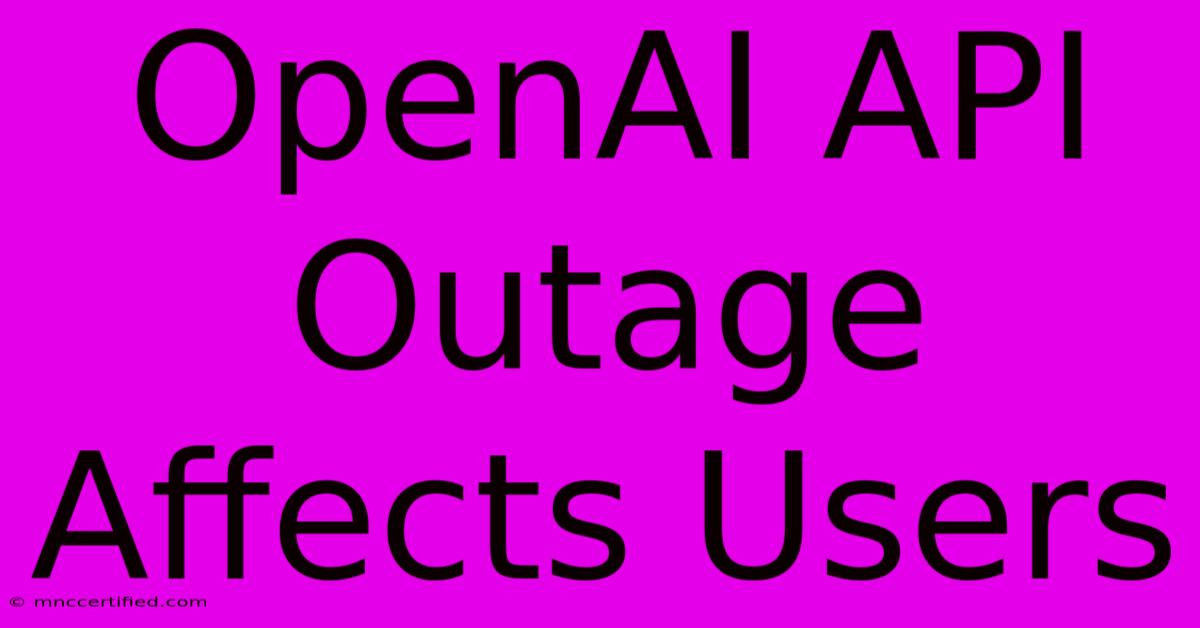OpenAI API Outage Affects Users

Table of Contents
OpenAI API Outage Affects Users: Causes, Impact, and Solutions
OpenAI's API is a powerful tool for developers, powering countless applications and services. However, like any large-scale system, it's susceptible to outages. Recent disruptions have highlighted the critical importance of API reliability and the significant impact outages can have on users. This article delves into the causes, consequences, and potential solutions surrounding OpenAI API outages.
Understanding the Impact of OpenAI API Outages
When the OpenAI API goes down, the ripple effect is substantial. Depending on the severity and duration of the outage, users experience a range of problems:
- Application Downtime: Applications relying on the OpenAI API for core functionality become completely inaccessible. This can lead to significant losses in productivity and revenue for businesses, especially those heavily reliant on AI-powered features.
- Disrupted User Experience: Users face frustrating error messages and inability to access services, leading to negative reviews and potential loss of customers.
- Lost Data: In some cases, outages may lead to partial or complete data loss, especially if applications aren't properly handling API errors and implementing robust backup mechanisms.
- Financial Losses: Businesses dependent on the OpenAI API can experience considerable financial losses due to downtime, lost sales, and the costs associated with resolving the issues.
- Reputational Damage: Extended outages can severely damage a company's reputation, eroding trust and potentially impacting future user acquisition.
Common Causes of OpenAI API Outages
Several factors can contribute to OpenAI API outages:
- High Demand and Server Capacity: Periods of exceptionally high demand can overwhelm OpenAI's servers, leading to slowdowns and eventual outages. This is particularly common during peak usage times or when new features are released.
- Software Bugs and Errors: Bugs in the OpenAI API codebase can lead to unexpected errors and system instability. These bugs may require immediate fixes and lead to temporary shutdowns while patches are implemented.
- Network Issues: Problems with OpenAI's underlying network infrastructure, such as connectivity issues or hardware failures, can prevent users from accessing the API.
- Maintenance and Upgrades: Planned maintenance and system upgrades are necessary to ensure the API's long-term stability and performance. However, these activities can cause temporary disruptions.
- Third-Party Dependencies: The OpenAI API may rely on other third-party services. Outages in these dependent services can trigger cascading failures within the OpenAI API itself.
- Cybersecurity Incidents: While less frequent, security breaches or cyberattacks can disrupt API functionality and require immediate action to mitigate the threat.
Mitigation Strategies and Solutions
Developers and businesses can employ several strategies to minimize the impact of OpenAI API outages:
- Robust Error Handling: Implement comprehensive error handling mechanisms in applications to gracefully manage API failures. This involves catching exceptions, displaying informative error messages to users, and implementing fallback mechanisms.
- Caching and Queuing: Employ caching strategies to store frequently accessed data locally, reducing reliance on the API during periods of high load. Queuing systems can help manage requests efficiently during outages.
- API Monitoring and Alerting: Use monitoring tools to track API availability and performance. Configure alerts to receive immediate notifications about outages, allowing for prompt responses.
- Redundancy and Failover Mechanisms: Design applications with redundancy in mind. This may involve using multiple API providers or having backup systems to ensure continuous operation during outages.
- Disaster Recovery Planning: Develop a comprehensive disaster recovery plan that outlines procedures for responding to and recovering from API outages. This plan should include communication strategies, data backup and restoration procedures, and escalation protocols.
- Communication with OpenAI: Stay updated on OpenAI's status page and announcements regarding potential outages or planned maintenance. Direct communication with OpenAI support can provide valuable insights and assistance.
Conclusion: Preparing for the Inevitable
OpenAI API outages, while infrequent, are an unavoidable reality. By understanding the potential causes, impact, and implementing proactive mitigation strategies, developers and businesses can minimize the disruption and ensure the resilience of their AI-powered applications. A robust error handling strategy, coupled with comprehensive monitoring and disaster recovery planning, is crucial for maintaining a positive user experience and safeguarding business continuity. The key is proactive planning and preparation – ensuring your applications are resilient enough to weather the storm when an OpenAI API outage strikes.

Thank you for visiting our website wich cover about OpenAI API Outage Affects Users. We hope the information provided has been useful to you. Feel free to contact us if you have any questions or need further assistance. See you next time and dont miss to bookmark.
Featured Posts
-
H 1 B Visa The Musk Ramaswamy Debate
Dec 28, 2024
-
Syracuse Washington State Game Prediction 2024 Holiday
Dec 28, 2024
-
Bbc Beyond Paradise Christmas Special Date
Dec 28, 2024
-
30 Year Old Charged With Quadruple Attempted Murder
Dec 28, 2024
-
Midshipmen Defeat Oklahoma
Dec 28, 2024